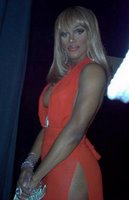
One of my TSTB members posted to the list last week a comment about how surprised and shocked she was to see how some African-American transwomen treat each other.
It's nothing new.
The way some of 'The Gurls' negatively interact with one another is a long-term observation of mine that has exasperated me over the two decades I've been around the African-American transgender community.
WARNING: What follows are my personal observations. If they hit too
close to home, nothing personal. To borrow the words of the late DJ icon Jack 'The Rapper' Gibson, I'm tellin' it like it 'TIS' is.
We're basically split into six factions. The Street Girls, the Stealth Girls, The Club Girls, The Pageant/Show Girls, The Crossdressing Girls, and the Real World Girls.
Some of the Street Girls either HATE on everybody that's in the other
four groups or harbor deep suspicions about their transsistahs.
They've had hard lives and resent the fact that in their eyes,
the 'rest of us have it easy' or 'we look down our noses at them'.
They feel like everything should be handed to them on a silver
platter since they've had to struggle for everything they get.
The Stealth Girls blitzkrieg through the transition process, get their surgery, and then disappear never to be seen again in the transgender community. They are women now and they believe that they are better than pre-ops because they don't have that pesky male organ between their legs. Some of them cut off all contact with out transgender people and won't be caught dead at a drag show or GLBT club. They don't want even a hint of suspicion from the people that are in their new lives that they're transgendered.
The Club Girls lives revolve around the various GLBT clubs sprinkled across the nation. Some are well into their transitions while others are crossdressing until they can get to that point. They hang out trying to pick up `husbands' to validate their new gender identity or `trade' to make a fast buck. They are hostile to any other t-girl that comes into their turf that's prettier, smarter, younger, more popular or `fishy' looking than they are.
The Pageant/Show Girls lives revolve around the various transgender beauty pageant circuits that are held across the nation and the drag shows in various GLBT clubs. They are a fairly tight knit sorority. Some of them have interests outside that world, others don't.
The Crossdressing Girls are the ones that are either in the early stages of discovering whether they are transgendered or just dress in women's clothes for the fun of it. There's some friction between them and the t-girls because they remind the t-girls too much of where they came from and wish to forget.
The Crossdressing girls sometimes forget that t-girls AREN'T guys on `mones, we are emotionally women. When they treat t-girls as one of the fellas they resent it. T-girls have pissed off crossdressers by making snide comments about their ability to pass as women, which is a sensitive subject with them.
The Real World Girls are the ones who are so far out of the closet it would take a bulldozer to shove them back into it. They're the activists and the peeps who are out and about in the community. They annoy the other groups on various levels. The street and club girls consider them uppity and elitist. The stealth girls wish they would quit 'rocking the boat' with their activism so that they can continue hiding and living their lives as women. The pageant girls are indifferent about it and the crossdressers have split loyalties on the subject.
Is it any wonder why we've had such a hard time building a cohesive community with all this Hateraid between the various groups?
The bottom line is that our enemies hate all of us no matter what faction we belong to. We are all potential victims of hate crimes because of who we are. If everybody would take a deep breath and realize that we all have something substantive to bring to the table as we build a community, there's no telling what we could accomplish pulling together.






